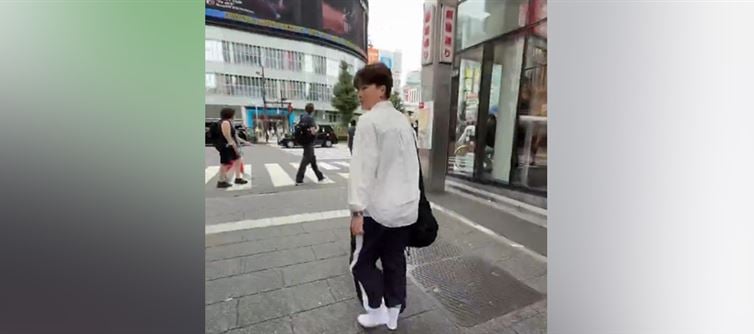
A man in pristine white socks walking a kilometer through Japanese streets has gone viral, showcasing the staggering cleanliness of urban Japan. His socks emerged spotless — a feat almost unimaginable on indian streets, where potholes, garbage, open drains, and dust are the everyday reality. The stark contrast exposes not just our urban neglect but the utter failure of civic responsibility and governance in India’s cities.
👣 THE WHITE SOCK TEST: japan VS INDIA
In japan, sidewalks are immaculate, garbage is carefully sorted, and public spaces are respected, allowing even barefoot or sock-clad walks without worry. The man’s kilometer-long stroll became a viral symbol of civic pride, a quiet demonstration of discipline, accountability, and societal respect for cleanliness.
Contrast this with India: even inside well-maintained private complexes like DLF Cyber Hub, streets accumulate dust and debris fast. On public roads, no socks — and often not even shoes — could survive 100 meters without picking up dirt, grime, or worse.
🏚️ indian STREETS: A NATIONAL EMBARRASSMENT
From potholes that double as mini swimming pools during monsoons to garbage-strewn sidewalks, India’s urban infrastructure fails at basic hygiene. Open drains release stench into the air, dust clouds coat clothing in seconds, and stray waste ensures that a simple walk becomes a battle against filth.
While japan turns cleanliness into a societal virtue, india struggles to enforce waste disposal, street sweeping, and civic discipline. Even in cities that brand themselves as modern and cosmopolitan, the streets betray a failure of planning, governance, and citizen responsibility.
🌬️ DIRT IN THE AIR, NOT JUST ON THE GROUND
The problem in india isn’t limited to garbage on the streets. Dust, vehicle emissions, and industrial pollution ensure that clothes, shoes, and socks pick up dirt simply by breathing the city air. A short walk is enough to ruin even freshly laundered attire, highlighting how urban pollution compounds the problem of civic neglect.
🔥 WHY japan GETS IT RIGHT
Japan’s streets are clean because society, government, and individuals all share responsibility. people don’t litter, waste is managed meticulously, and civic authorities maintain strict cleanliness protocols. The result: a clean, breathable, and safe environment, where white socks can survive a full kilometer of walking unscathed — something indian cities can only dream of.
⚠️ FINAL TAKE:
The white sock challenge isn’t just about footwear; it’s a symbol of civic pride, responsibility, and societal discipline. India’s failure to achieve even basic cleanliness reflects deeper issues in urban governance, public awareness, and enforcement.
One viral video shows the world walking cleanly. Meanwhile, in india, 100 meters on the streets is enough to remind us that we have a long, dirty road ahead before civic pride matches ambition.




 click and follow Indiaherald WhatsApp channel
click and follow Indiaherald WhatsApp channel